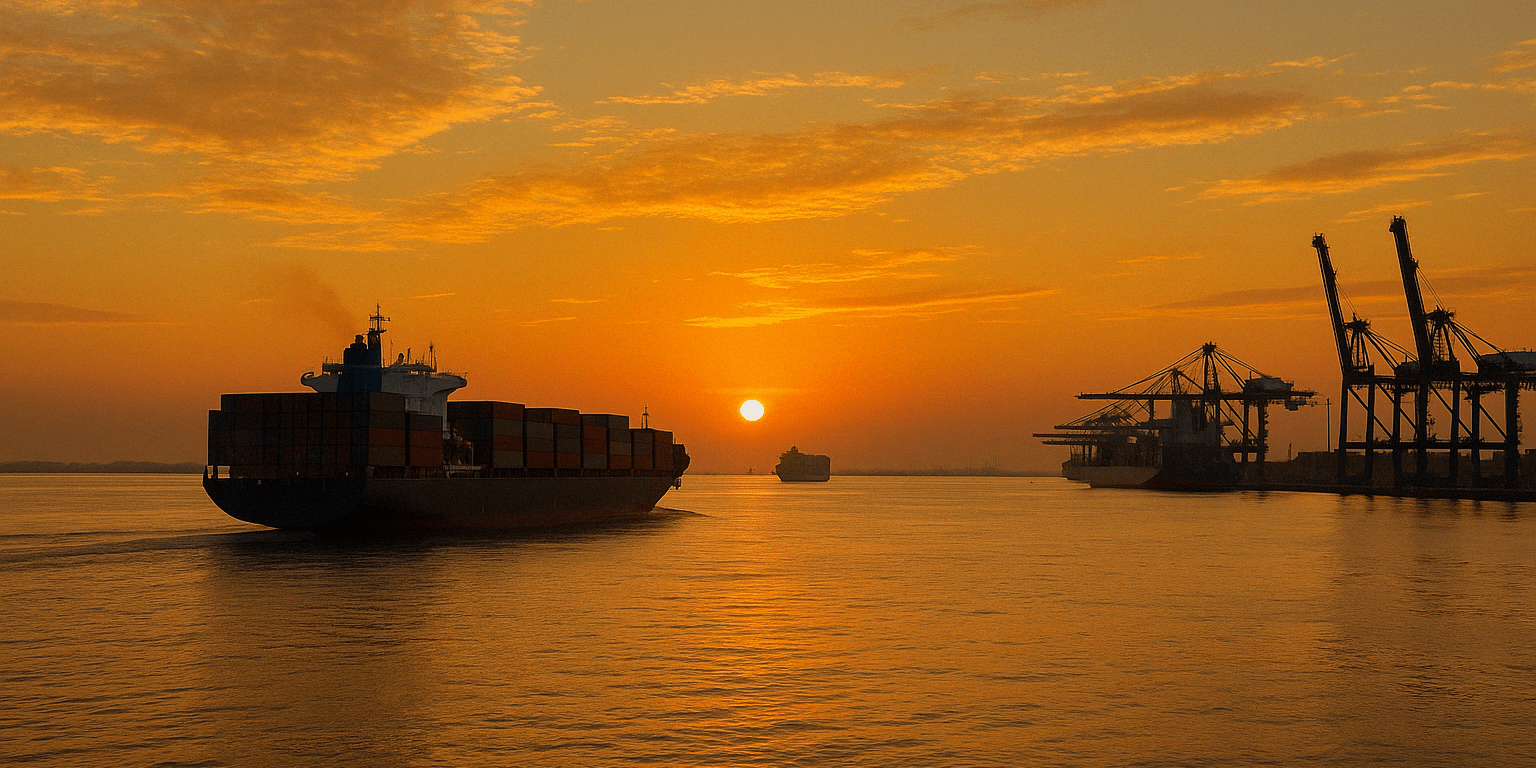Large international vessel owners almost all over the world will now be subjected to a greenhouse gas emissions tax on shipping under the International Maritime Organization (IMO). Decided by vote on Friday, April 11, 2025, this is the first-ever international carbon tax that will affect emissions caused by shipping cargo, the industry that accounts for 3% of global carbon emissions.
Starting in 2028, ship owners will have to pay a $380 fine per metric ton for every additional CO2 emitted above the agreed limit. On top of that, under stricter measures, an extra $100 penalty per ton will be charged on greenhouse gas emissions. These measures are aimed at reducing the net carbon footprint of the global shipping industry by 20% by the year 2030 and completely eradicating it by the year 2050.
Ships in 2030 will have to reduce the intensity of their carbon emissions by 8% as the general standard compared to the 2008 baseline, and by 21% according to the stricter standard. By 2035, ships will have a higher general standard of 30% and a stricter standard of 43% reduction in the intensity of their greenhouse gas emissions.
The IMO is expected to gain $11 to $13 billion in yearly revenues and $40 billion in fees starting 2030, a proportion of which will be used to make expensive zero emission fuels more affordable. Its net zero fund will invest in research and development to reach fuels and technology that align with its green shipping goals. They will also assist developing nations, making sure they have access to cleaner fuels and can transition to greener ships.
Currently, ships use diesel because it is the cheapest. After crude oil is refined into kerosene for aviation and petrol for cars, diesel is left, which is what ships burn. Zero or near zero carbon emissions fuel costs will be a stark contrast to the cheapest oil in the market for the shipping industry.
The International Chamber of Shipping represents 80% of the world’s shipping cargo. They are concerned about the “lack of focus” on actually turning zero and near zero fuels into a reality. Simon Bennett, deputy secretary-general of the group, stated that currently there are no fuels that do not emit greenhouse gases except for experimental projects. So, the heavy R&D that requires investments to find a solution needs to be incentivized by a market for these new fuels.
It is important to note that this is long overdue progress from the 2015 Paris Agreement, which conveniently left out carbon regulations on shipping due to how international the shipping industry is.
The International Maritime Organization (IMO) has 176 member states, which means its 176 members, consisting of multiple different countries and islands, have to abide by the carbon regulations. A whopping 90% of global trade is conducted through shipping, so exporting costs of countries failing to follow these measures will go up significantly.
Even though all 176 IMO members are now subjected to this change, not all members are for this move. Usually, IMO agreements are agreed upon by consensus, but this agreement had to be reached through a vote, due to oil producing countries. More than 60 nations including China, Brazil, the United Kingdom, South Africa, and many European countries, voted for this policy, while 16 nations opposed. And 24 other nations disagree with the measures as they “do too little, too late” to cut shipping emissions and protect their islands. These 24 nations, including a group of nations from the Pacific Islands, abstained as they demand stronger repercussions against carbon emitters that threaten the very existence of their nations. The majority vote was passed on Friday, but the final adoption of these measures will be approved in an IMO meeting in October 2025. The 24 nations hope for a stricter revision of the policies in this October meeting.
Among these 24 nations is Tuvalu, a low-lying island country in Oceania. It is such low-lying countries like Tuvalu that carbon emissions have the highest impact on, even though they are one of the smallest contributors. Simon Kofe, Tuvalu’s minister for transport, energy, communication, and innovation, said, “We came as climate vulnerable countries — with the greatest need and the clearest solution. And what did we face? Weak alternatives from the world’s biggest economies.” Rising sea levels directly endanger their very existence, and extreme climate conditions are the most pronounced in these nations. Essentially, they bear the brunt of what other countries do to the planet.
In 2023, the UN identified several countries to be at risk from the problem of rising sea levels, like Bangladesh, China, India, and the Netherlands, as 900 million people live in low-lying coastal areas in these countries. Since 1880, global sea levels have risen about 8-9 inches. Just like Tuvalu, many other small island nations like Kiribati are seriously vulnerable to these sea level changes.
Several countries have voiced their approval of this pro-climate policy, while others have controversially disapproved.
Saudi Arabia asked for the vote due to their disapproval of the policy. Disapproving measures that seem very standard given the ongoing climate crisis may be shocking, but Saudi Arabia is an oil producing giant, and these policies that are aimed at preserving the environment and essentially the planet, hurt their business directly. Many other oil producing nations also backed Saudi Arabia, such as Russia.
However, countries that do a great deal of shipping their trade to the rest of the world, like China and Brazil, had asked for negotiations earlier but eventually agreed to the final measures decided on Friday, April 11th.
Unsurprisingly, the United States under Donald Trump’s administration has vehemently opposed this policy. Under businessman Trump, the US has, in the last few months, withdrawn from the Paris agreement, so their opposition to this green policy comes as no surprise. The US government stated that the shipping tax would “impose substantial economic burdens” and “drive inflation”. According to the Guardian, leaked US documents threaten President Trump’s infamous “reciprocal measures” on this carbon tax as well. The US only accounts for 0.57% of worldwide shipping tonnage, so its decisions do not significantly affect future IMO revenues.
The European Union seems to be on the IMO’s side as the European Commission has called this shipping carbon tax “a meaningful step” towards the Paris agreement. This sentiment is also shared by the United Kingdom, as their transport minister, Heidi Alexander, expressed her approval of these regulations, stating how they would act as an incentive to reduce emissions and encourage the development of green fuel technology.
Environmentalists argue that the fines are not significant enough, as it may just be cheaper to pay these penalties rather than invest in more expensive, greener fuels. Emma Fenton, senior director for climate diplomacy at an English climate change nonprofit, “Opportunity Green”, said that at the volume of the fees, ships would just be paying to pollute, rather than actually decarbonizing.
Since the big economies are opposing the levy, such as the US, Russia, and Saudi Arabia, poor countries fear they might lose out in the end. Ambassador Albon Ishoda from the Marshall Islands, speaking for an alliance of Pacific and Caribbean small island states, told the Guardian that rich nations and large developing countries were “backsliding” on previous promises.
So, all in all, this new carbon tax seems to be a minuscule and overdue step in the right direction despite all its criticisms. The low price point of the tax and how nations are opposing such a basic fee aimed at improving the climate crisis really portrays an image that rich, powerful economies do not care about who goes under water as long as their businesses run well. When entire nations face the possibility of extinction and countries still adopt policies in favor of business revenues, it begs the question: are lives and homes less important than business profits?










